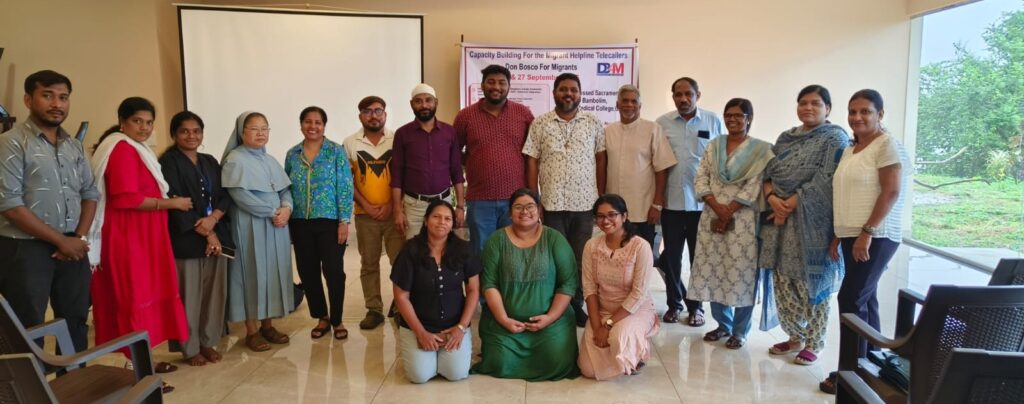
In a significant step toward strengthening support systems for migrant communities in India, Don Bosco for Migrants (DB4M), under the leadership of Fr. Francis Bosco, organized a two-day Capacity Building Program for Migrant Helpline Tele callers on 26th and 27 September 2025 at Provincial House, Odxel, Goa. The program brought together tele callers, social workers, and religious leaders from across the country to enhance their understanding of migrant issues and improve response mechanisms for helpline interventions. The inaugural session began with a prayer led by Fr. Marvin, INP and a welcome address, with the presence of Fr. Clive Telles, Provincial of Goa, adding spiritual depth and institutional support to the gathering. Participants from Salesian provinces, Mumbai, Goa, Kerala, Hyderabad, Kolkata, as well as networks like Jesuits, ICM, MSMHC, the Blessed Sacrament Fathers, and others reflected the national scope of the initiative.
Fr. Francis Bosco, in charge of the Migrants Ministry, delivered the keynote, stressing the importance of helpline distress calls and inviting present to join in the movement of responding to the needs of young internal migrants across India. He outlined the objectives of the program and walked participants through the two-day schedule. His first session offered a comprehensive understanding of migration and migrant vulnerabilities in India, describing the realities of inter- and intra-state informal workers across diverse sectors such as construction, brick kilns, waste picking, sugarcane cutting, coffee and tea plantations, fishing, and forest-based livelihoods. These workers, he emphasized, endure precarious conditions, with constant risks of wage theft, unsafe environments, and lack of social protections.
Prof. Dr. Kinshuk Sarkar, Associate Professor at the Goa Institute of Management, who explored labour laws, social security schemes, and migrant worker rights at both source and destination, led the second session. He explained the vulnerabilities of seasonal, circular, and interstate migrants, linking their struggles to systemic wage theft, documentation gaps, and unsafe working conditions. He provided insights into labour market dynamics, differences between organized and unorganized sectors, and the role of welfare boards, trade unions, and social security schemes such as PF and ESI. Using Goa as a case study, he illustrated how the reliance on migrant labour in construction, agriculture, and domestic services often leads to oversupply, wage depression, and exploitation. He discussed the distinctions between minimum wage, fair wage, and living wage, noting that most migrants receive only the legal minimum, if at all. Prof. Sarkar also analised flawed methods of measuring unemployment, which underreport poverty, and emphasized that labour, must never be reduced to an economic input but must always be treated as a matter of dignity and human rights.
In his practical guidance, Prof. Sarkar detailed steps migrants can take to recover unpaid wages, the importance of wage slips, and timeframes for receiving payments, daily, fortnightly, or monthly. He urged workers to always document their employers and contractors and explained industry-specific regulations for construction sites, factories, and brick kilns. Concluding, he reminded the audience that labour is not about supply and demand equations but about people, dignity, and justice. The day continued with a powerful session by Sr. Rose Paite, who shed light on the plight of domestic workers, particularly North East migrant women in Goa. She stressed the importance of mobilization, registration, and documentation, sharing real-life stories that underscored the urgency of systemic change. Fr. Francis Bosco and Ms. Bhakti from Suraksha, INB, followed with a practical session on filing wage theft complaints, maintaining case records, and preparing helpline reports, reinforcing the role of preparedness and documentation.
The second day of the program focused on the rights of migrant women and children, beginning with an insightful session by Prof. Peter, former Chairperson of the State Commission for Protection of Child Rights (SCPCR), Goa, and Associate Professor at Goa University. He unpacked the United Nations Convention on the Rights of the Child (UNCRC), emphasizing survival, protection, development, and participation as non-negotiable entitlements. Migrant children, he explained, are among the most at risk due to poverty, mobility, identity gaps, and language barriers. He described distressing realities of children growing up in roadside shelters and tarpaulin tents, with no toilets, safe water, or healthcare access, and hospitals refusing treatment without IDs or money. He emphasized the role of Anganwadis, mid-year school admissions, bridge courses, and schemes like One Nation, One Ration Card in ensuring survival and development. Cases of adolescent girls pulled out of schools for sibling care, and children denied safe play spaces due to constant relocation, highlighted systemic failures. Prof. Peter also drew attention to child protection issues, including online exploitation, abuse, and neglect, calling for child protection policies, sensitive rescue operations, and functional grievance redressal mechanisms. Participation rights, he stressed, must be upheld through platforms like the national 1098 child helpline, Special Juvenile Police Units, and Child Welfare Committees empowered to provide care plans and interventions. He concluded with a strong call for collaboration between governments, NGOs, and civil society to ensure migrant children are guaranteed their rights as universal entitlements.
This was followed by a legal session from Ms. Caroline, High Court Advocate, Goa, who explained the role of statutory bodies such as the National Human Rights Commission (NHRC), National Commission for Protection of Child Rights (NCPCR), State and District Legal Services Authorities (SLSA/DLSA), and Women’s Commissions in protecting migrant rights. She contextualized migrant realities in Goa, where prejudice persists in derogatory terms like Ghatty, Lamam, and Mamma, and where North East migrants working in spas are misidentified as “Chinese” or “Nepalese.” She explained Goa’s unique history of progressive property laws and the uniform civil code, alongside the principle that ignorance of the law is no excuse. Migrants, she noted, need to be aware of key legal processes such as Zero FIR, panchanama, and the Indian Evidence Act’s safeguards against police confessions being used in court. She also highlighted challenges around bail, where migrants often face discrimination, and the corruption linked to professional sureties. At the same time, she emphasized the availability of free legal aid, pro bono lawyers, and recourse through human rights courts, women’s commissions, and children’s commissions. Her message was clear: migrants are not voiceless—the system provides mechanisms for justice, but awareness and access are critical.
The program concluded with reflections from participants and a call to action by Fr. Francis Bosco, who urged Migrant Desk members to engage actively with government departments, police, and trade unions, respond to helpline calls with empathy, document cases diligently, and collaborate with NGOs to build awareness among migrant workers. He expressed gratitude to the INP Province for hosting the program, Fr. Clive Telles (Provincial of Goa), the Vice Provincial, Fr. Jose Sequira, Fr. Mervin, Fr. Savio, the Blessed Sacrament Fathers, the Bethany Sisters, and the Provincial House for their support in planning and implementing the program.
The Helpline Telecallers Capacity Building Program 2025 was more than a training event; it was a reaffirmation of solidarity with migrant communities. It equipped telecallers not only with knowledge and skills but also with the conviction to be empathetic responders and strong advocates for justice, dignity, and systemic change.
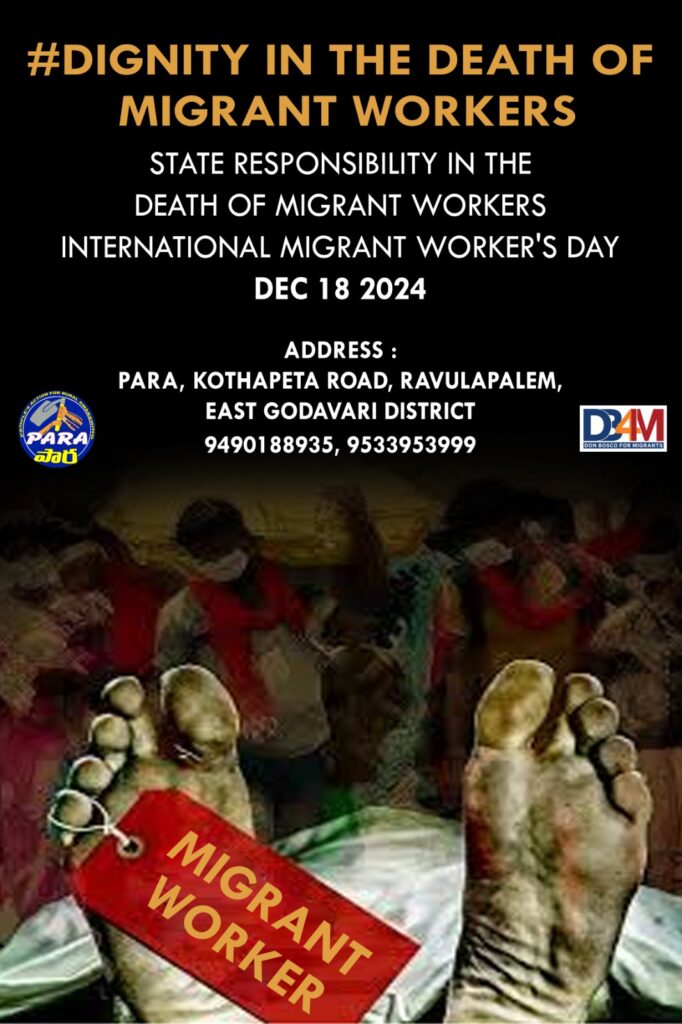
International migrant workers day is celebrated in a grand manner on December 18 of every year. Don Bosco for Migrants celebrate on this day the Distressed Internal migrant’s workers day in India. As you know that, there are imbalances in the growth of industries and development among the states, especially the north and the south states. Political centres, Industrial centres, created urban concentrated development in few states. To these states poor, tribal, Adivasi’s, Dalit’s, backward castes move for their livelihood from their source states. On one side we are celebrating the internal migrant workers day for which the remittance, the work opportunities were open to the source states informal workers. The other side we see that these informal workers who migrate get into the clutches of exploitation, abuse, and no rights of a worker in any sector which they work- minimum wages, hours of work, decent working conditions, contract or agreement, decent living conditions, shelter, health, education, registration as workers in the employees portal in labour department, no social securities – ESI, EPF, maternity leave, and other benefits. How to celebrate these informalities in the work? Anyhow, we celebrate because it is not international but internal needs real concern. How ILO, MFA, ICMC, IOM will look into these informal workers within the country? |
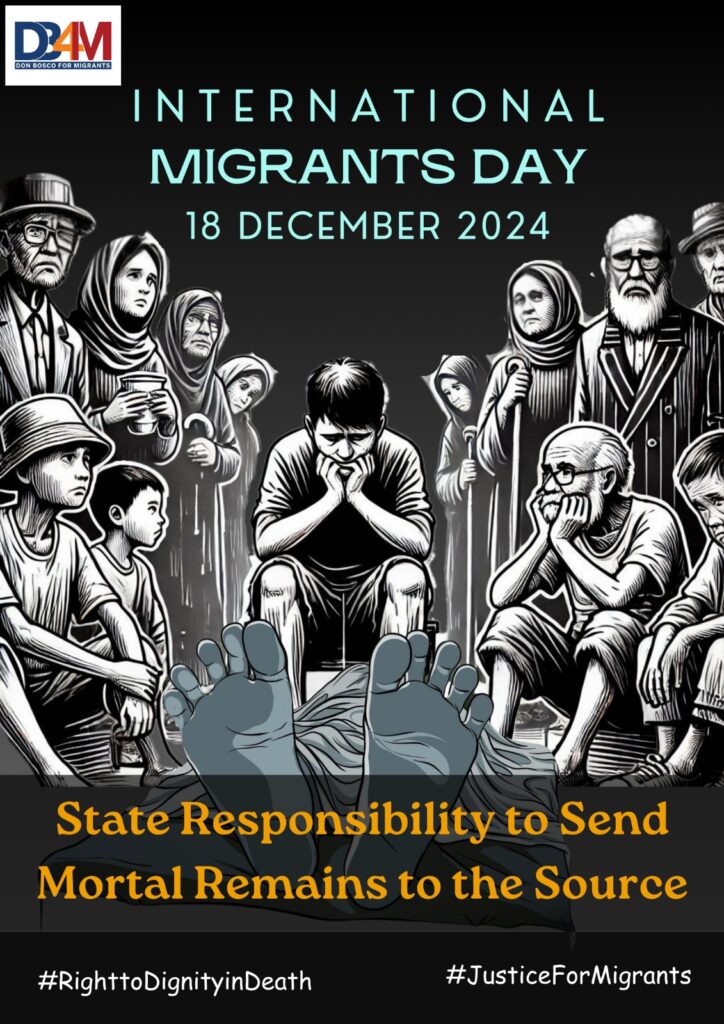
After the opening of the market, liberalisation and globalisation, all industries have a chain Informality of the workers is still maintained in the labour, due to the ease of work for the employers or cheap labour, or submissiveness of migrant workers, or the onus of the employers to register the employees in the factory or company or industry portal of the labour department. |
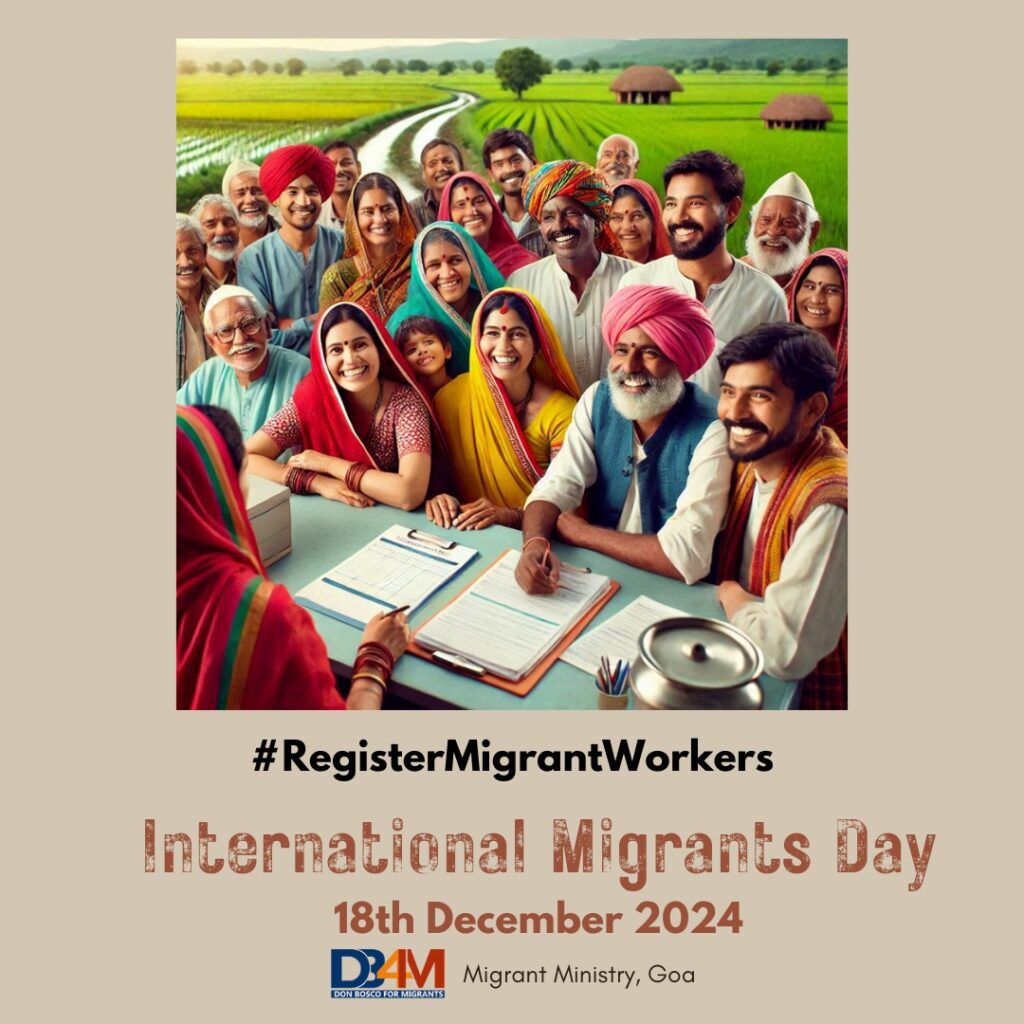
Informal workers in the state within India – construction workers, Brick kiln workers, head loaders, gig workers, domestic and housekeeping workers, fish workers, salt pan workers, tea or coffee estate workers, street vendors, sex workers, dhobi workers, agricultural workers, rag picking workers, sanitation workers, saloons, etc. – these workers use their physic and work outside the factories, companies or industries. Why not these workers are not treated as workers? Why the government is not treating them as workers? Why there is no legal framework for these workers?
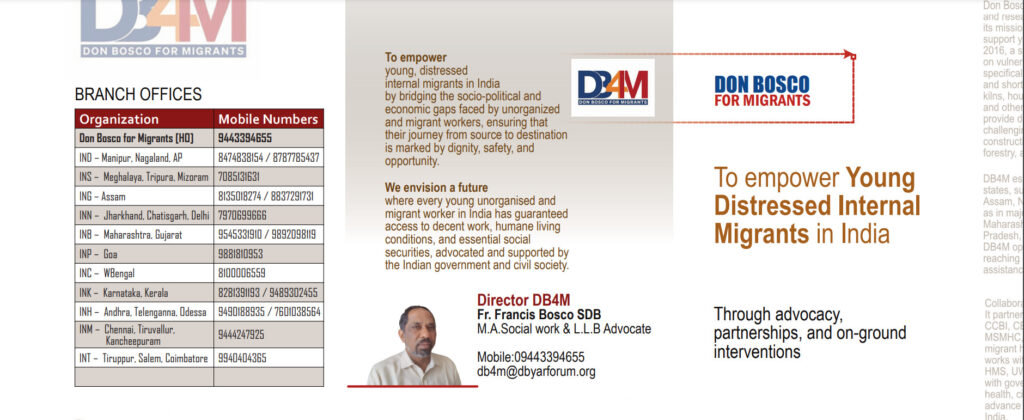
Call to Action
Programmes suggested for organising International Migrant Workers Day
1. Stakeholder Consultation on Migrant Worker Issues.
2. Awareness Rally with Posters and Banners on Migrant Rights.
3. Social Media Campaign: Stand with Migrant Workers, Decent Work Decent Pay.
4. Essay, Speech, Drawing, and Dance Competitions on Migrant Worker Rights.
5. Health and Wellbeing Camps for Migrant Workers and Families.
6. Recognition and Award Ceremony for Migrant Workers.
7. Cultural Programs Displaying Migrant Communities’ Traditions.
8. Launch of New Migrant Help Desks or Initiatives.
9. Collaborative Events with NGOs, Schools, and Trade Unions.
10. Inter-Faith Prayer Meetings for Solidarity with Migrants.equality, and dignity for all workers in India.
Fr. Francis Bosco SDB
Don Bosco for Migrants
C991,Sector 7-Dwarka, New Delhi
110077
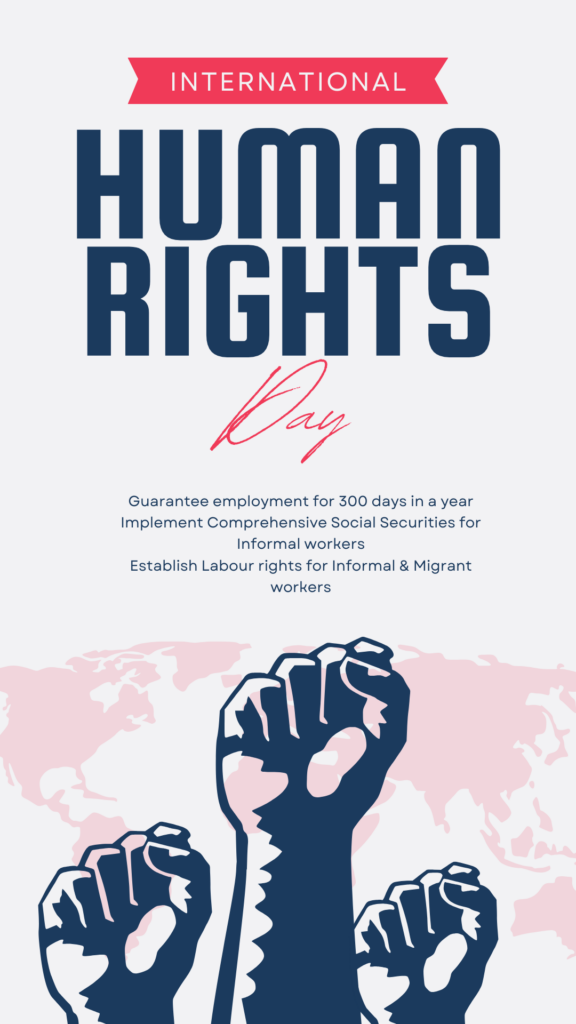
On the occasion of International Human Rights Day, we, the advocates of migrant and informal
workers’ welfare, urge the Indian and state governments to address the persistent injustices and challenges faced by these vulnerable groups. It is imperative that their basic rights, as guaranteed under the Constitution and international frameworks, are upheld through immediate and sustained action.
1. Guarantee Employment for 300 days in a year
2. Implement Comprehensive Social Security for Informal Workers
3. Establish a Legal Framework for Informal and Migrant Sectors
4. Guarantee Labor Rights for Informal and Migrant Workers
Call to Action
We urge the Indian and state governments to act swiftly to protect and empower informal and migrant workers, who are the backbone of the country’s economy. On this Human Rights Day, let us pledge to bridge the gap between constitutional promises and lived realities, ensuring justice,
equality, and dignity for all workers in India.
Fr.Francis Bosco
Don Bosco for Migrants
C991,Sector 7-Dwarka, New Delhi
110077
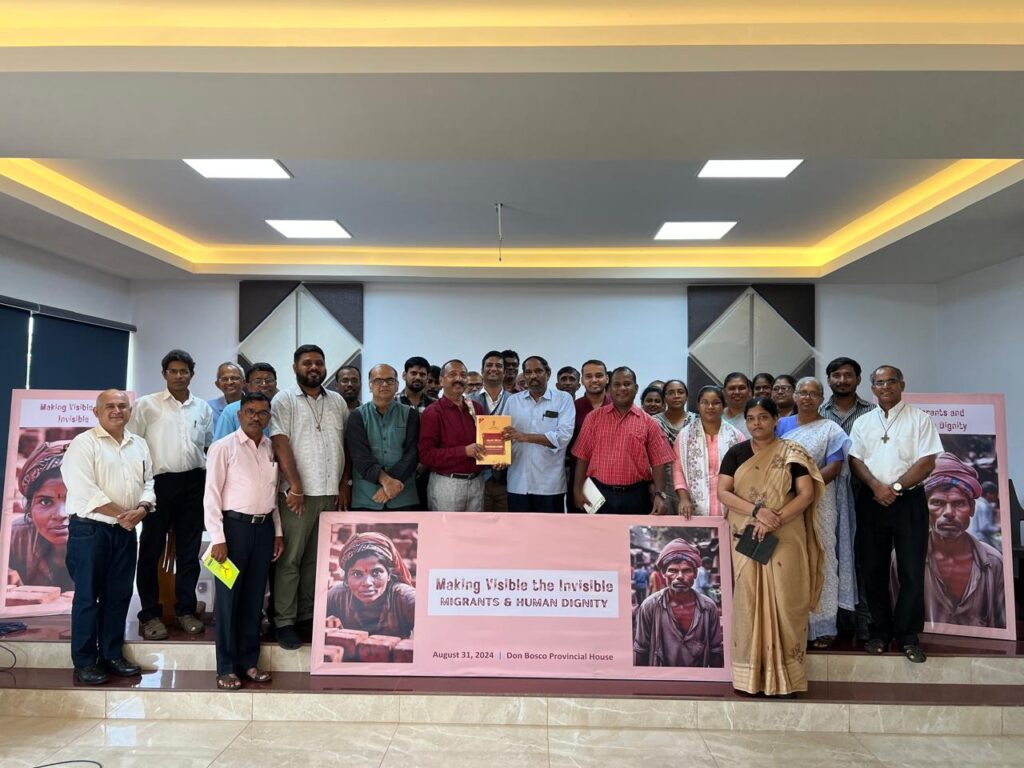
Goa, August 31, 2024 – A coalition of organizations and advocates gathered at the Provincial House in Goa for a half-day meeting to address the pressing challenges faced by distressed young migrants. This significant event, titled “Together for the Dignity of Distressed Young Migrants,” brought together leaders from various sectors to share insights, discuss interventions, and plan collaborative efforts aimed at improving the lives of migrants.
Keynote Address: Legal and Policy Perspectives
Dr. Kingshuk Sarcar, Associate Professor at Goa Institute of Management (GIM) and former Labour Commissioner of West Bengal, delivered the keynote address. He provided an in-depth analysis of the existing labour laws concerning inter-state migration, shedding light on the legal frameworks that govern migrant workers’ rights. His remarks emphasized the urgent need to align policy implementation with the growing challenges faced by migrants, especially in securing their rights and protections across state borders.
Highlighting Migrant Support Initiatives
Several key speakers presented their organizations’ ongoing efforts to assist distressed migrants. Fr. Joe Nazareth, SJ, of the Migrant Assistance and Information Network (MAIN), along with Ms. Feliza Goes of PRAVASI BANDHU, and Fr. Jose Sequeira, Director of the Migrant Desk at INP (BOSCO SAHARA), spoke of their collective work. They outlined the various support mechanisms put in place, including the establishment of a short-stay home in Old Goa, efforts in securing entitlements, improving access to education, healthcare, and providing skill training for migrants.
Mr. Prashant Edavi, representing the Dattopant Thengadi National Board for Workers Education and Development (DTNBWED), formerly known as the Central Board for Workers Education (CBWE), provided valuable insights into government schemes available to migrant workers. He discussed the e-Shram card, a vital resource for migrant workers, along with other entitlements that could significantly improve their living and working conditions.
Tech-Based Interventions for Migrants
Ms. Nidhi Vaigankar from the DISHA Foundation highlighted the role of technology in supporting migrant workers. She elaborated on the SharamaGaurav app, developed by DISHA Foundation, which provides crucial resources for migrants. Additionally, she emphasized the importance of the ShramiKendra helpline, which offers support and guidance for workers in distress.
The National Migrant Workshop, a significant event held in Mumbai on August 16-17, provided a vital platform for the Don Bosco for Migrants Network (DB4M) to learn, share, and address the pressing challenges of the distressed migrants in India. The workshop saw active participation from DB4M representatives from all Indian provinces, including religious and Church bodies CCBI and CBCI, NGOs, and Trade Unions, fostering a diverse and collaborative environment.
The second day of the National Migrant Workshop, held in Mumbai on August 17, organized by the Don Bosco for Migrants (DB4M) network partners, saw a collaborative effort with the Catholic Bishops' Conference of India (CBCI), Conference of Catholic Bishops of India (CCBI) and other organizations. Together, they drew a comprehensive roadmap for enhancing migrant services, including shelter and basic needs, source and destination services, emergency helplines, data collection, networking and advocacy, workers' collectives, and social integration.The workshop commenced with a solemn Eucharist, a significant moment led by Father Ignatius Gari from the Guwahati Province, Father Sameer Minj, a Jesuit from Bangalore, and Father Maria Arockiadoss from
Delhi. Their contributions, including Fr. Gari’s homily on the importance of commitment and genuine support, and Fr. Arockiadoss’s reflective prayer, set a profound tone for the workshop. The inauguration ceremony also featured a prayer dance performed by girls from Prafulta. The Provincial Fr. Savio Silveira, Mumbai Province, welcomed participants, highlighting the workshop’s alignment with St. John Bosco’s birthday, and urged them to focus on whether to prioritize migrant settlers or the temporarily displaced, calling for clear strategies in the migrant ministry. He reflected on how Don Bosco was a migrant, performing small jobs to sustain himself. Father Santiagu, the Provincial of Salesian Province of Hyderabad (INH) and in charge of Young at Risk and Migrants Networks, praised the participants’ commitment, emphasizing the need for a supportive and comforting approach, and encouraged the development of actionable plans. In his keynote address, Bishop Alwyn D’silva referenced Pope Francis’ encyclical Fratelli Tutti and emphasized that we must become neighbours to migrants rather than deciding who our neighbours are. He stressed the importance of pastoral care for migrants, particularly those in low-skilled jobs who face exploitation and lack legal protections. Bishop D’silva also highlighted the need for the Church to accompany migrants in their faith journeys. Father Francis Bosco, in charge of the South Asia Migrant Ministry, provided a historical overview of Don Bosco’s advocacy for migrants, detailing the development of the Young at Risk (YaR) seminars and SPCSA decisions that shaped the migrant ministry in India. He highlighted key strategies like the source-destination connect, migrant protection forums, helplines, data collection, networking, and advocacy efforts, all crucial in addressing the challenges faced by migrants across the country. Christine Nathan from the International Catholic Migration Commission (ICMC) underscored the importance of a unified response from Church organizations and international bodies, emphasizing the need for fair labor practices and social justice for migrant families. Participants engaged in insightful presentations and discussions throughout the two-day event, sharing successful strategies and identifying common challenges. The panel discussion highlighted various approaches employed by the provinces, showcasing their efforts in data collection, legal aid, education, and collaboration with government schemes. The representatives were: Fr. George D’Breo – Mumbai, Fr. Angel – Dimapur, Fr. Saji Elemmbersil – Kerala, Fr. Maria Arockiadoss – Delhi, Fr. Deepu Mathew – Karnataka, Mr. Rintu – Kolkata, Fr. Simolin – Chennai, Fr. Aruldoss – Andhra Pradesh, Telangana, and Odisha, Sr. Pramila Lobo, UFS – Nagaland, Fr. Jose Sequera – Goa, Sr. Lissama Joseph, MSMHC – Assam, Fr. Ignatius Gari and Fr. Albert Thrymiang -Gauhati.
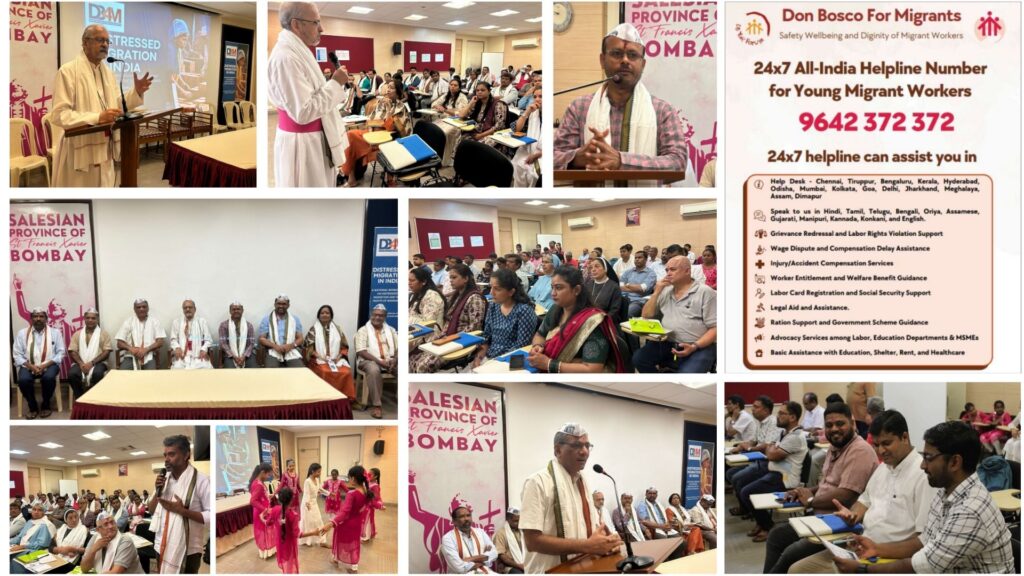
The concluding day began with a Eucharistic celebration by Fr. Santiagu, the Provincial of Hyderabad. The Provincial emphasized the importance of a childlike attitude in working within broad networks rather than confined to narrow circles. The day proceeded with a prayer and reflection by Fr. Jose Sequera and Fr. Marwin from Goa, focusing on the importance of welcoming and serving migrants and refugees.
Fr. Jaison Vadassery, Secretary of Migrations, the Conference of Catholic Bishops of India (CCBI), stressed the importance of synergy and synodality in fostering a unified national identity rooted in pastoral care. Addressing the pressing issues faced by youth in Bangladesh and Sri Lanka, he urged civil societies to collaborate in supporting distressed migrants. He outlined CCBI’s ambitious 10-year mission plan (2025-2035), which focuses on human dignity and pastoral care, and called for collective commitment to this cause. Fr. Jaison proposed practical measures such as creating directories, establishing legal cells, enhancing pastoral care, utilizing the Catholic Connect app for migrant data, celebrating cultural festivals, and strengthening networks to provide shelter support for migrants.Fr. George Thomas, Secretary of Labour, the Catholic Bishops’ Conference of India (CBCI), shared valuable insights into Kerala’s labour movement. He emphasized the need to move from a parish-centric approach to a more collaborative model in grassroots ministry and highlighted the importance of working together across communities to address workers’ challenges. Ms. Felcia Goes added to the discussion by providing details on the efforts of the Workers India Federation and labour unions, underscoring the role of collective action in supporting labour rights and improving conditions for workers.
Addressing the distressed migrant issues, Ms. Bhakti Vardan and Mr. Vishal from Aajeevika Bureau focused on informal labour sector advocacy. At the same time, Fr. Benny from Odisha discussed plans for migrant help desks. Fr. Roshan OMI and Sr. Moksha FMA highlighted collaborative efforts in Tamil Nadu and Mumbai. Ms. Shweta from the Working People’s Charter and Sr. Christy from the National Domestic Workers Federation emphasized campaigns for worker rights. Fr. Junus from Shillong, Mr. Vishal from India Labour Line, and Fr. Amit Kujur SJ from Mumbai discussed support for migrant education, legal aid, and cultural adaptation.

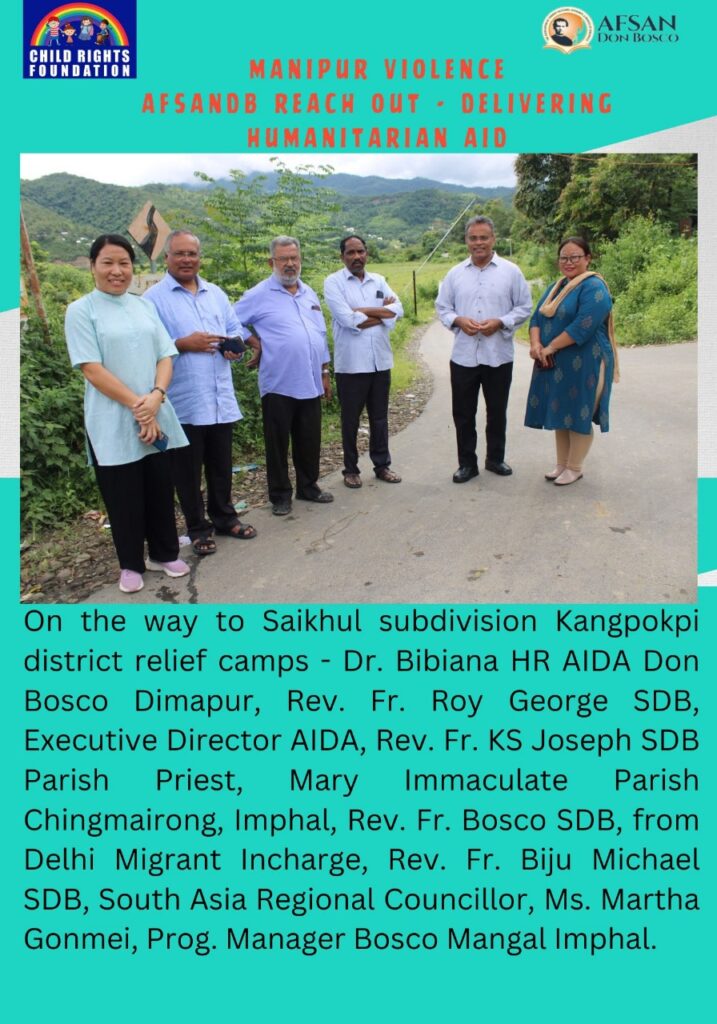
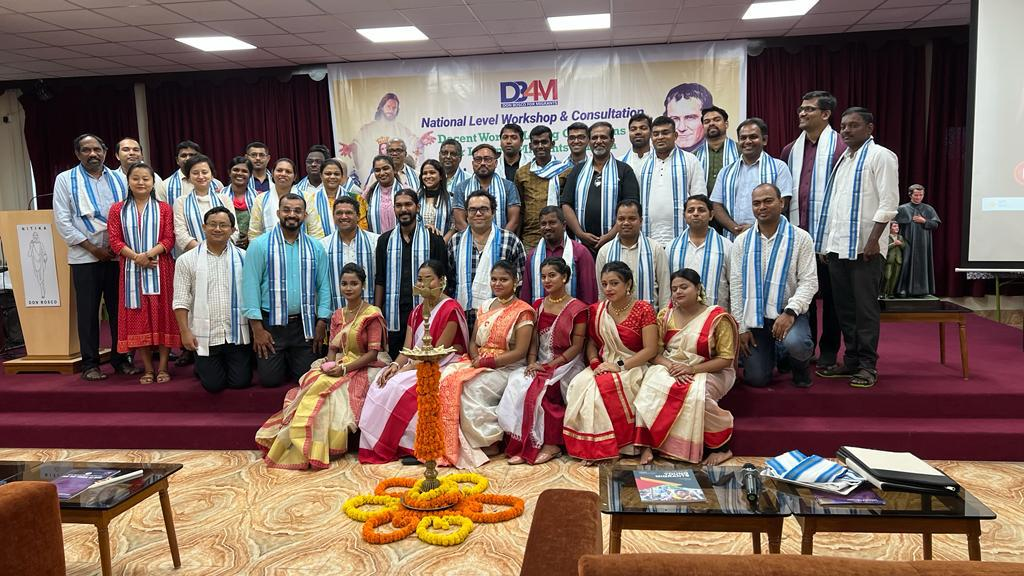
“Decent Work & Living Conditions for the Internal Migrants in India” was the guiding theme of the recently held National Migrants Workshop during 11 th & 12 th of July 2023, organized by the YaR Forum, SPCI, Delhi. Forty delegates from 21 Migrant Desks in Indian Provinces participated in this workshop. In addition, Migrant Desk Salesians, Staff and volunteers attended this meeting. Fr.Pauria INC Provincial Inaugurated the National Migrant Workshop on 11 th July 2023. Fr.Francis, CCBI, Kolkata and Fr.Suneel, INC Vice-provincial were the Key speakers during the inaugural function. All the delegates were welcomed with Bengali cultural tradition by Kolkata Province.
The two- day Migrant Workshop focused on the themes, “Challenges faced by the Migrants &
Unorganized workers in India” by Social Activist, Anruradha Talawal, “Occupational Health, Safety and Social Securities for the Migrants” by Divya Varma, and the Helpline services by India Labour Line, MAIN( Migrant Assistance & Information Network and DB4M Labor Line were addressed. Fr.Saji, Fr.Ratna and Mr.Rian, presented Status Paper of Migrants in Kerala, Andhra and Tamilnadu.
Afternoon sessions concentrated on the sharing of the Migrant Desks activities and plans. The
workshop concluded with a Way Forward action plans to optimize our migrant strategies including strengthening logistics, upgrading service delivery, capacity building, updated training modules, and networking, legal mediation and policy advocacy. Thanks to Fr.Provincial, Fr.Economer, Bro.Lawrance and Fr.Cheriatt for organizing this workshop in Kolkata.
The Don Bosco for Migrants (DB4M) online meeting was held on 16th June 2023, from 15:00 to 17:00 hrs. The meeting aimed to discuss various agenda items related to the DB4M project and foster collaboration among different provinces and stakeholders. This report provides a summary of the key discussions and outcomes of the meeting. The meeting began with a prayer seeking blessings and guidance, by Fr. Joseph Prabhu. After the self-introduction of the DB4M desk fathers and staff members, each province provided updates on the ongoing DB4M project interventions. Fr.Francis Bosco informed the group regarding the National Migrant consultation at Kolkata, DB4M 2023 half-yearly project submission by June 2023, Migrant Voice for the Voiceless programme on 12th and 13th of July 2023, Delhi and to promote DB4M Helpline number among stakeholders.
Participants had the opportunity to seek clarifications on project timelines, start and end dates, as well as raise concerns about the practical aspects of project implementation and also shared their challenges regarding migrant ministry. A clarion call was made regarding the ongoing ethnic cleansing and communal violence in Manipur since May 3, 2023, highlighting the need to connect destination migrant desks with dispossessed and displaced Manipuris seeking refuge in different cities and to provide integrated support including placement, housing and post trauma counselling. The meeting concluded on time, and Fr. Francis Bosco expressed gratitude to all participants for their active engagement, valuable contributions, and commitment to the cause of migrant welfare.
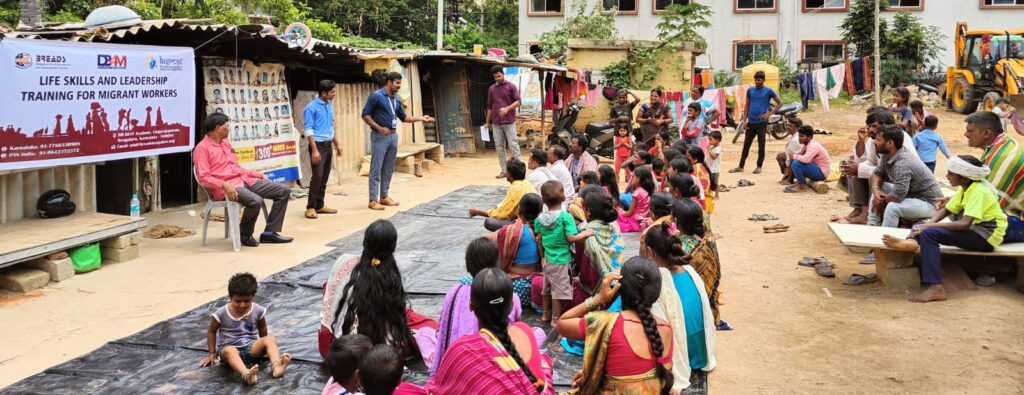
Life Skills and Leadership Training for Migrant Workers was conducted by KISMAT (Karnataka Interstate Migrants Alliance for Transformation) at HBR Layout and Banjara Layout, Bangalore on 2nd and 18th July 2023. The programme started with welcoming the participants and resource person, Mr. Dhanashekar the General Secretary of Karnataka State Construction Workers Central Union (KSCWCU) affiliated to National Centre for Labour (N.C.L). A powerful session on Life Skills and Leadership Training was given to migrant workers belonging to three different communities who come from the district of Raichur, Gulbarga, Yadgiri and Bellary in the State of Karnataka. They are engaged in professions such as daily casual labour, construction work, driving and domestic work for the past four-five years in Bangalore.
The training was given on social-welfare schemes provided by Karnataka Building and Other Construction Workers Welfare Board, which includes mobile hospital facilities, pension schemes, family pension schemes, handicap pension, training cum tool kit facility, maternity facility, competitive examination training, educational scholarship, pilot education for children, accident compensation, funeral allowances, accidental polices, emergency aid and free tool kits by government. Important emphasis was made on state legal aid service authority. Approximately 113 migrants participated in the programme.
The purpose of the programme was to train leaders of migrant communities, taking the lead in preventing migrant issues and sustaining themselves to fight for their rights. At the end of the session migrants took part in the interaction and clarified their doubts. Different possibilities to find solutions to the problems were discussed and decided upon.
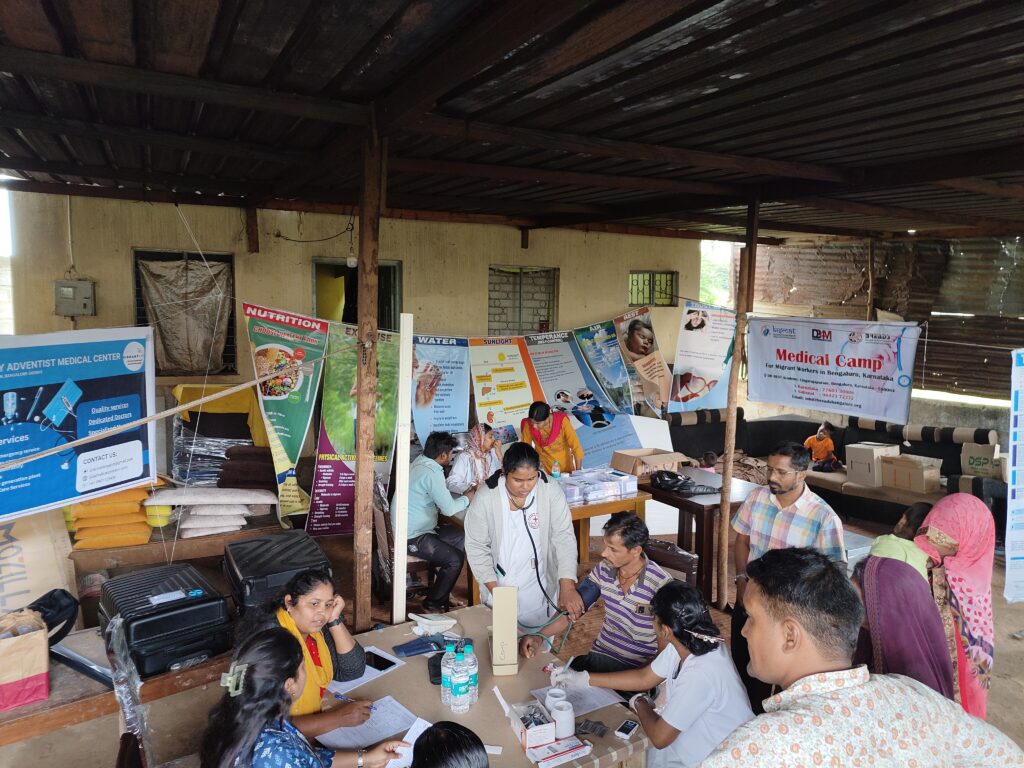
KISMAT (Karnataka Interstate Migrant Alliance For Transformation) organized a free Medical Health Checkup for migrant workers engaged in daily casual labour, construction work, and domestic work from North Karnataka. This event took place on 13th and 20thAugust 2023 at Banjara Layout and Kalkere Main Road, Bangalore.
At the heart of the event were physical examinations conducted by the medical professionals. The doctors recommended a variety of health check-ups, tailored to each individual, to assess their overall health and identify potential issues at an early stage. Among the adult population, prevalent complaints encompassed back pain, knee pain, insufficient protein intake, low water consumption, skin allergies and anemia among females.
Approximately 139 migrant workers reaped the benefits of this health camp. However, a cause for concern arose as it came to light that migrant workers often lack regular check-ups. The KISMAT Karnataka arranged this medical camp with a noble goal-to raise awareness among underprivileged migrant workers. The challenge these workers face when attempting to access healthcare services are substantial, including language barriers, lack of proper documentation, and limited financial resources. These barriers prevent many migrant workers from obtaining necessary medical attention, potentially resulting in sever health complications.
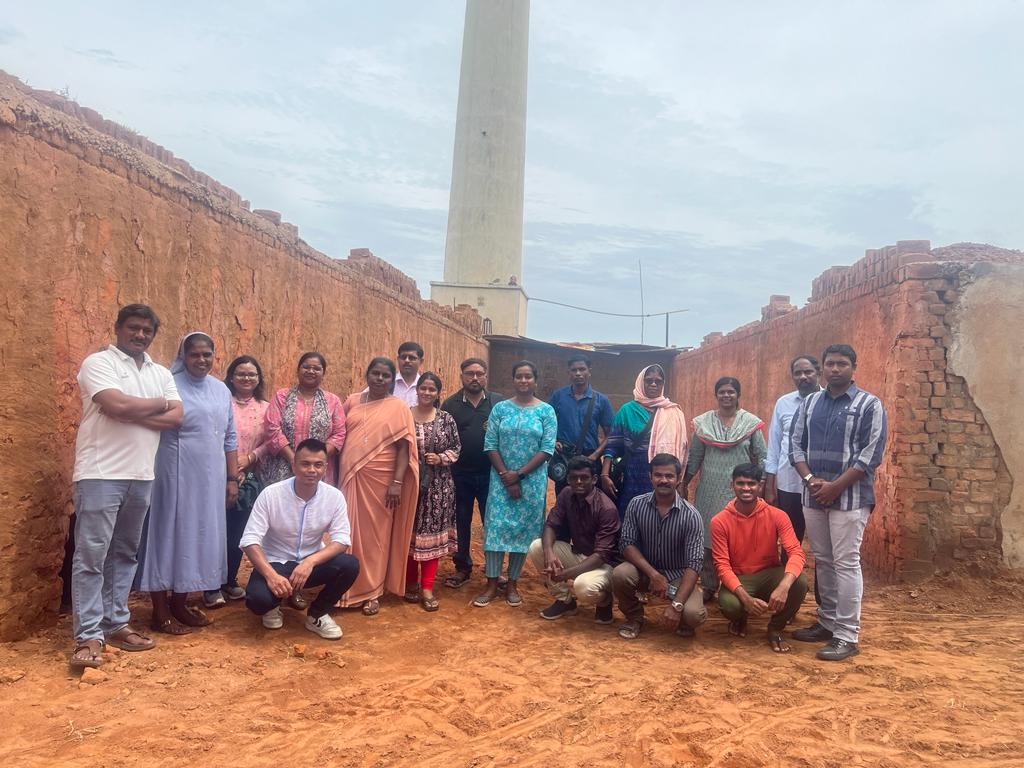
On 2 nd and 3 rd of September 2023, DB4M(YaR) organized an exposure programme to facilitate understanding of strategies and intervention towards Intra and Inter-State Migrants in Chennai, Tiruvalluvar, Kanchipuram and Chengalpattu districts in Tamilnadu.
DB4M Staff members from all our Provinces and collaborating congregations including Holy cross sisters, SVDs, and Immaculate Heart of Mary sisters actively took part in this unique exposure programme in Chennai; the highlight of this exercise is the one on one direct interaction with migrants and stakeholders during the two day intensive field observation .
2 nd September 2023, started with Holy Eucharist in the morning, followed by the discussion with the various unorganized workers trade unions in Citadel, Chennai, including Tamilnadu domestic workers federation, Fishermen’s union, unorganized workers federation, Samyukta Kisan Morcha, Annai illam, Pengal urimai iyyakkam. After the interaction the team went around visiting the allied government departments for migration; interaction with Dr.Manivelan, Occupational Health and Safety, DMS, Chennai, Mr.Nirmal, Social Welfare Officer, TNUHDB, Mr. Darwin, TNUHDB slum officer, Perumbakkam were resourceful to gauge the migration issues and challenges.
The visiting delegates also directly met the Migrant workers involved in manufacturing sector at Mambakkam, Sriperumbdur, Kanchipuram district to observe, first hand, the living and working conditions of the migrant workers. DBMS’ pivotal strategy of having its desk, located in the very vicinity of the migrants and assisting them for their safety and protection was particularly appreciated.
3 rd September 2023, with the Holy Eucharist the team reached to Brick kilns in Tiruvalluvar district. The strategies and the education plan for the Odessa children were elaborated in discussion with the owners and the employees of Odessa brick kiln families.
Thanks to all the DB4M migrant desk Directors of the provinces for deputing their delegates to
attend in this fruitful exposure in understanding the implementation of migrant activities in INM province in 4 districts in Tamilnadu. Thanks to INM Provincial, Vice-Provincial, Fr.Simolin, Director Migrant desk, Fr.Lourdu and DBMS staff members for organizing this event in Chennai.
Fr.Francis Bosco
DBYaR Forum(Migrants)
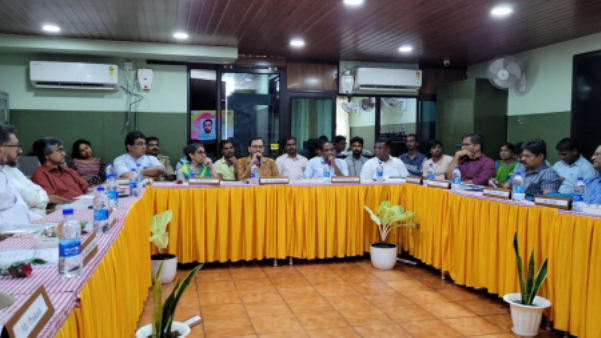
Minutes of the consultation
Trivandrum Don Bosco Veedu Society conducted a consultation to improve quality services to Migrants in Kerala. Major purpose of the consultation was to converge experience and expertise of stakeholders engaged in migrant services and to deliberate on the importance of networking to serve migrants. 44 persons who head various government departments and NGOs attended the consultation. Eight leaders represented migrant community in the district
11 Government Departments, namely, District Legal Service Authority, Labour Department, Centre for Development Studies, Child Welfare Committee, Railway Police Force, Police Department, Health Department, District Child Protection Unit, Childline, Mahilamandiram, and Vimukthi have contributed in the meeting.
Eleven Non-Government agencies attended the consultation. They are Don Bosco Veedu Society, Trivandrum Social Service Society, Malankara Social Service Society, Daleview, Sadan (Dream), Sebastian Indian Social Projects, Thanal, Migrant Extension Services – Loyola College, Advana, Hotel and Restaurant association and DoC.
Fr. Jiji Kalavanal, Rector of Don Bosco Veedu formally welcomed and Fr. Saji Elambasseril, Director of Don Bosco Veedu set the stage by sharing “The Migrant Landscape of Kerala”. Mr. S. Shamnad (Sub-Judge and Secretary DLSA) was the chief guest of the consultation. Fr. Francis Bosco, National Director, DB4M made a brief presentation on “Migrant Scenario in India” followed by Prof. (Dr) Praveena Kodoth, CDS Trivandrum, on “Importance of Networking to Serve Migrants Better” with evidences and data from across the country.
All stakeholders shared their views and recommendations to build strong networking to serve migrants in the group discussion moderated by Mr. A. V. George, Sr. Manager, Don Bosco. A core team was formed from the participants to further plan and schedule next round of consultation wherein all stakeholders who could not attend this meeting would be represented and engaged.
Major points and recommendations;
• How can the usage of drugs and substance be combatted among migrants? • Identification of existing resources available with civil society organizations and NGOs be collectively utilized for the welfare of migrants
Way forward
Fr. Mathew Thomas – Salesian representative to UN, facilitated a way forward session enabling participants to finalyse future plan of action. The core committee will further consider and take it forward.
List of core committee members;
The meeting concluded with a vote of thanks proposed by Mr. Manuel George, Program Manager, Don Bosco Veedu.
<<<end of minutes>>>
Connect with us
Quick Links
Write to us